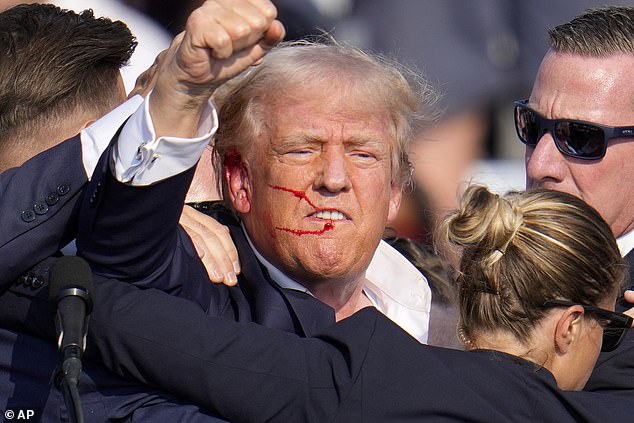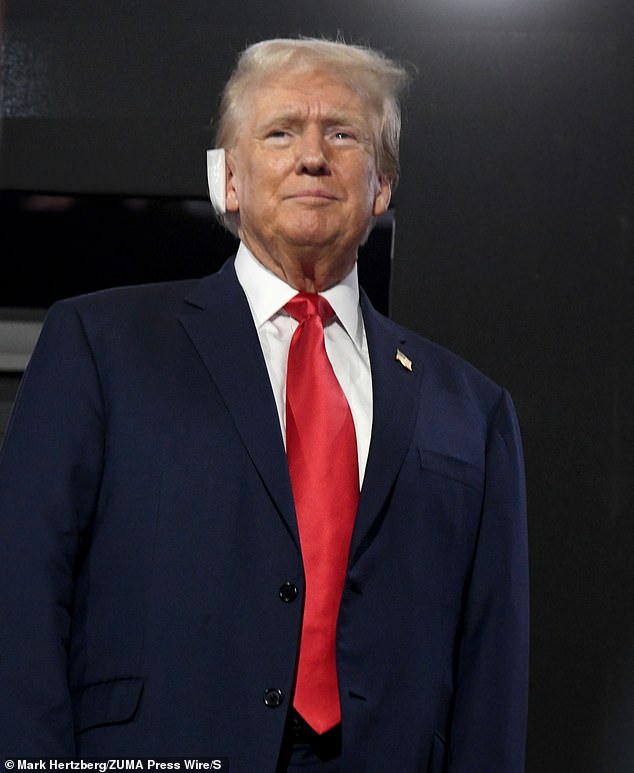Donald Trump did his best to hide it, but when he stepped out into Milwaukee’s Fiserv Forum for his first appearance since Saturday’s attack, his body betrayed him. The smile was fixed, the walk slow and slightly unsteady. Then, as he looked out at the huge crowd of cheering supporters, he suddenly looked down, as if trying to block out the moment.
Much has been said and written in the days since the shooting, particularly on its implications for the presidential race and the broader toxicity of American political culture. It has reignited debate over gun control and the alleged shortcomings of the US Secret Service, which in turn have given rise to a plethora of conspiracy theories on the internet.
But there has been virtually no discussion of what this means for Donald Trump the man. Less than 48 hours earlier, death had literally run its fingers across his cheek. Yet there he was, being pushed into a stadium where thousands of people were chanting, “Fight! Fight! Fight!” — the words Trump shouted immediately after the shooting.
Donald Trump attends the Republican National Convention at the Fiserv Forum in Milwaukee with his ear bandaged following the assassination attempt.
And fight he will. Whatever one’s opinion of Trump, there is no doubting the courage and defiance he displayed in the immediate aftermath of the attack. No doubt a part of him will relish his near-martyrdom, but there is something slightly obscene about the way our political circus simply washes the blood off the stage and moves on. It demands that its acrobats and jugglers simply bandage their wounds (physical and psychological) and carry on performing. Or that they be indifferently brushed aside when they cannot do so.
Last week I was speaking to an MP who had narrowly lost her seat in the election. Obviously, what she experienced was very different to what the former President experienced at the Butler Farm showground, but it still hurt her deeply.
“I was at the counting site,” she told me, “and suddenly I felt like I was attending my own funeral. I was standing on the stage listening to the counting officer, and my life as I knew it was coming to an end. It was like I was listening to them read my own obituary.”
Democracy is necessarily brutal. Those in power are regularly held accountable by the people. And national governance is a difficult task, requiring resilience and strength. But it is time to start having a proper debate about the mental health of our politicians.
I personally know a high-level politician who is currently in need of serious psychological support, but for some reason he is not provided with any kind of proper care. He appears on radio and television shows, continues to write articles for newspapers and regularly promotes himself on social media. He does all this with the knowledge and consent of people he would call his friends and “allies.”

The former president, covered in blood from the bullet that grazed his ear, raises his fist at the event in Pennsylvania on Saturday
What they desperately need, however, is a period out of the public eye, away from the constant criticism and opprobrium of their opponents, where they can properly process and manage their very real feelings of personal and political pain.
This is not an isolated case. We place a lot of emphasis on “toughness” and all too often this ends up forcing our politicians to put up a facade. I know another senior politician who has a reputation as a “fighter” and who has been badly affected by the abuse he has received in his role as a minister. Once again, he needs proper support and, once again, none is being offered to him.
These mental health problems are not limited to our most senior politicians. Several months ago I was speaking to an MP who had become increasingly obsessed with a political issue and was angry at what he saw as the media’s failure to cover it sufficiently. “You are complicit,” he told me, “and there will be a reckoning. We will not waste bullets on you, we will opt for strangulation. You are on the side of the Nazis. And ‘I was only following orders’ will not be an excuse.”
That’s one of the most extreme cases, but there is currently no formal mental health support in one of the most stressful, public-facing professions. I asked a civil servant who had worked for one of our former prime ministers if he had been offered any counselling when he left office. He laughed. “Not that I know of. And I don’t think they would have taken it up if it had been offered anyway. Their attitude is: ‘This is how it is, you just have to accept it and get on with it.’”
Yet even the strongest figures find it hard to move on. Or, if they do, it leaves them scarred. Immediately after the Brighton bombing, Margaret Thatcher slept for a couple of hours on a bunk in a local police station, then got up and walked to her party conference. It was an incredible display of statesmanship and resilience.
But the experience changed her. Those close to her observed in the following years how Brighton had made her more reserved and reflective. Her personal assistant Cynthia Crawford told how the prime minister’s husband Denis had gone to Bond Street in the weeks after the attack and bought her a watch. “She told me that he had said to her: ‘This is to tell you that every minute counts.’ I think deep down she knew that she had been lucky that night, very lucky.”
Donald Trump will never admit it, but he will also need people to be there to support him in the coming weeks and months. And so will our own politicians.

